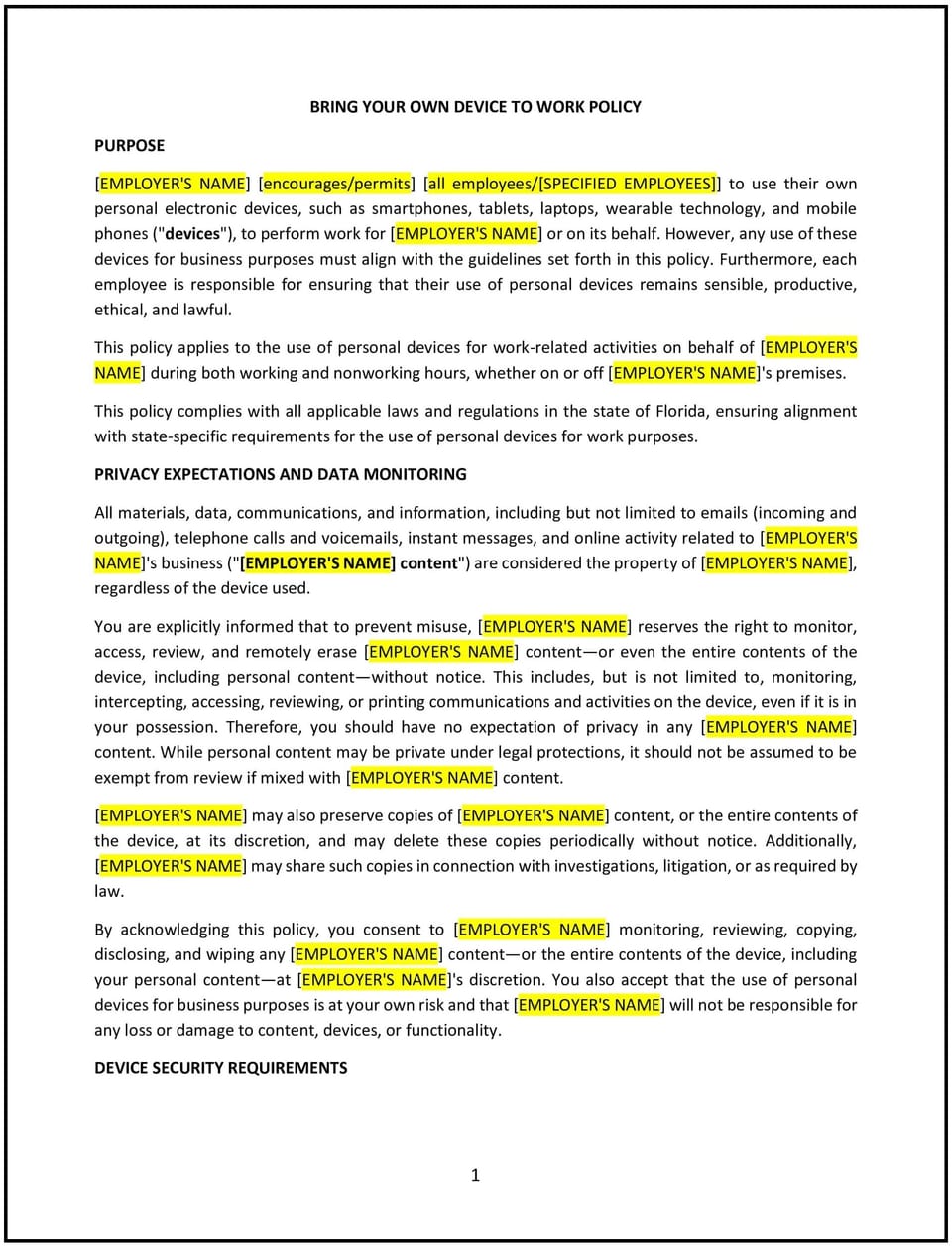Bring your own device to work policy (Florida): Free template

Bring your own device to work policy (Florida)
A bring your own device to work policy helps Florida businesses establish guidelines for employees who use personal devices, such as smartphones, tablets, or laptops, for work-related purposes. This policy outlines procedures for securing data, protecting privacy, and maintaining operational efficiency while allowing flexibility in the workplace. It is designed to promote productivity, reduce risks, and provide clear expectations for managing personal devices in a professional setting.
By implementing this policy, businesses in Florida can support flexible work arrangements, demonstrate their commitment to data security, and align with the state’s focus on innovation and adaptability.
How to use this bring your own device to work policy (Florida)
- Define eligible devices: Clearly specify which types of personal devices are allowed for work use, such as smartphones, tablets, or laptops.
- Establish security requirements: Outline steps employees must take to secure their devices, including password protection, encryption, and software updates.
- Address data access: Explain how employees should access company systems and data securely, such as through virtual private networks (VPNs) or multi-factor authentication.
- Specify acceptable use: Provide guidelines on appropriate use of personal devices for work-related tasks, including restrictions on downloading unauthorized apps or sharing company information.
- Include privacy considerations: Clarify how the business will handle personal data on employee devices and what information may be monitored or accessed.
- Communicate the policy: Share the policy with employees during onboarding and through regular communications to ensure awareness and understanding.
- Monitor adherence: Regularly review device usage and address any concerns or discrepancies promptly.
- Update the policy: Periodically assess the policy to reflect changes in technology, security risks, or business needs.
Benefits of using this bring your own device to work policy (Florida)
This policy offers several advantages for Florida businesses:
- Promotes flexibility: Allowing personal devices supports remote work and adaptable schedules, enhancing employee satisfaction.
- Reduces costs: Businesses can save on hardware expenses by leveraging employees’ personal devices.
- Enhances productivity: Employees can use familiar tools and devices, improving efficiency and engagement.
- Builds trust: Transparent policies demonstrate the business’s commitment to balancing flexibility with security.
- Aligns with local values: Reflects Florida’s emphasis on innovation, adaptability, and modern workplace practices.
- Improves security: Defined guidelines help protect sensitive company data from breaches or misuse.
- Supports growth: A robust policy facilitates scalable solutions for managing technology in dynamic work environments.
Tips for using this bring your own device to work policy (Florida)
- Communicate clearly: Ensure employees understand the policy by providing written materials and discussing it during meetings or training sessions.
- Train employees: Educate staff on securing their devices, accessing company systems, and adhering to acceptable use guidelines.
- Use technology: Leverage mobile device management (MDM) tools to monitor compliance, enforce security measures, and remotely wipe data if needed.
- Stay informed: Keep up with changes in cybersecurity threats, technology trends, or legal standards that may affect device management practices.
- Encourage feedback: Solicit input from employees to identify areas for improvement and ensure the policy meets their needs.
- Review periodically: Assess the policy’s effectiveness and make updates as needed to reflect changes in technology, risks, or business goals.
Q: Why should Florida businesses adopt a bring your own device to work policy?
A: Businesses should adopt this policy to promote flexibility, reduce costs, and ensure secure use of personal devices for work-related tasks.
Q: What security measures should businesses require for personal devices?
A: Businesses should require measures such as password protection, encryption, regular software updates, and antivirus software to safeguard company data.
Q: How should businesses handle data breaches involving personal devices?
A: Businesses should have a response plan that includes investigating the breach, notifying affected parties, and taking corrective actions such as remotely wiping data.
Q: Should businesses monitor personal devices used for work?
A: Businesses should monitor only work-related data and activities, respecting employees’ privacy while ensuring compliance with security requirements.
Q: What should businesses do if an employee leaves the company?
A: Businesses should ensure that all company data is removed from the employee’s device promptly and securely.
Q: How can businesses balance flexibility with security?
A: Businesses should establish clear guidelines for acceptable use, provide training on security practices, and use tools like MDM software to enforce policies.
Q: How often should businesses review the policy?
A: Businesses should review the policy annually or whenever there are significant changes in technology, security risks, or business operations.
This article contains general legal information and does not contain legal advice. Cobrief is not a law firm or a substitute for an attorney or law firm. The law is complex and changes often. For legal advice, please ask a lawyer.


